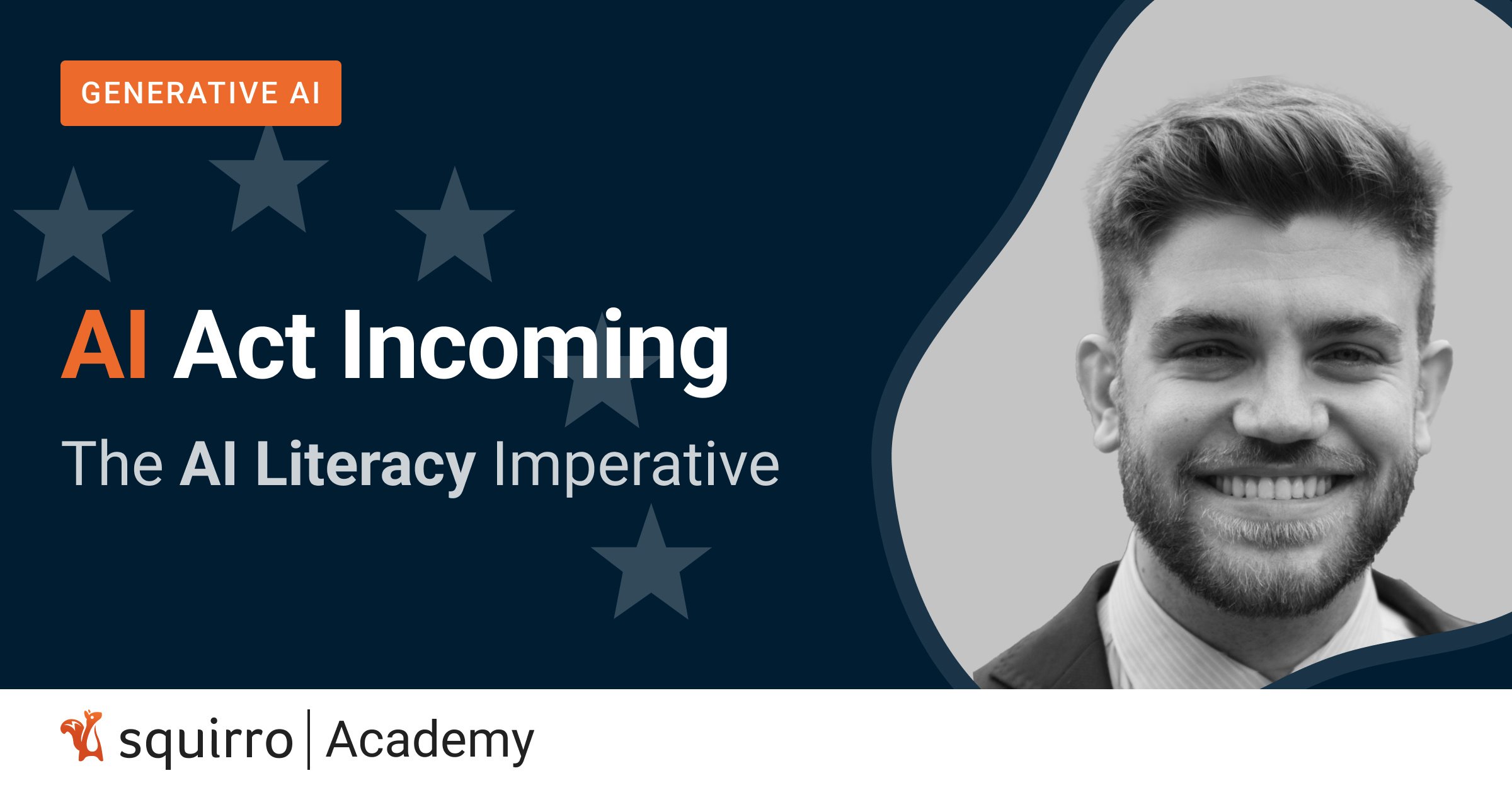With the EU AI Act set to take effect in January 2025, organizations have just six months to ensure compliance. This landmark legislation mandates AI literacy among staff and stakeholders, emphasizing technical knowledge, experience, education, and training. The AI Act requires transparency, explainability, and accountability in AI systems. It prohibits certain AI practices that pose unacceptable user risks while establishing a governance structure at the European and national levels to ensure compliance with the regulations.
Furthermore, to ensure compliance with regulatory frameworks like the AI Act, critical mechanisms known as the Acceptable Use Policies (AUPs) are essential for managing the risks associated with deploying foundation models. The effectiveness of AUPs depends on their enforcement, which remains a significant challenge. Governments and self-regulation will continue to play critical roles in ensuring the responsible use of AI technologies.
In today's rapidly evolving landscape, organizations must recognize that successful digital transformation extends far beyond merely implementing emerging technologies like Artificial Intelligence. To truly stay ahead in the age of agile transformation, companies need to focus on three key areas: technology implementation, workforce upskilling, and maintaining high standards of compliance.
In the words of Barry Scannell, legal expert in artificial intelligence (AI), copyright, IP, technology law and data protection recommends a proactive and balanced approach for business leaders:"I think organizations should develop and implement comprehensive Al training programs. These programs should cover not only technical aspects but also ethical considerations and societal impacts, ensuring a holistic understanding of Al deployment. Well-informed employees are better equipped to leverage Al technologies effectively and responsibly, balancing compliance with the potential for innovation."
The EU AI Act's mandate for AI literacy presents a significant challenge and opportunity for organizations.
The Squirro Academy, with its comprehensive educational ecosystem and expert-led training, is a natural solution for businesses seeking to meet this requirement. By investing in AI literacy, organizations can ensure the responsible use of AI technology while ultimately driving innovation and holistic upskilling practices in the age of augmented intelligence.
The Squirro Academy's focus on practical, skill-based training makes it an ideal starting point for organizations seeking to meet the EU AI Act's AI literacy requirements.
The Squirro Academy's Practical Approach to EU Compliance
The Squirro Academy is an educational ecosystem that offers technical and non-technical learning paths and is committed to staying at the forefront of AI education and literacy. We provide structured certification courses and self-paced learning opportunities with self-paced courses covering a wide range of subjects, including:
- Generative AI and Language Models: Utilizing Generative AI and Language Models in an Enterprise Setting
- AI Ethics and GRC: Enterprise Data Integrity and Compliance (resources and case-studies)
- Knowledge Graphs: Enterprise Data Reliability, Taxonomy
The Squirro Academy provides an accessible opening to those that want to embrace continuous learning through experimentation or defined development in AI, Machine Learning & No Code learning.
Take the first step towards ensuring AI literacy in your organization. Enroll in the Squirro Academy's courses and unlock the power of AI in your business. Browse all available courses open to the public.
We recommend exploring this course first. This immersive course covers timely applications of Large Language Models, LLMs, the technology underlying ChatGPT, Gemini, and other tools in the enterprise world.
The Squirro Academy's Four-Year Track Record
The Squirro Academy's course offerings cater to diverse industries and applications, including data integrity and scalable enterprise data solutions: ensuring reliability, governance, security and compliance concerts especially in the finance and health sectors addressing risk management.
As the adoption of artificial intelligence (AI) across various industries has created a pressing need for upskilling and education, tailored courses addressing industry-specific AI applications are becoming increasingly valuable for addressing unique challenges, capitalizing on sector-specific opportunities, ensuring competitiveness in rapidly evolving markets, improving decision-making processes, and enhancing productivity and efficiency. A critical first step in upskilling is a solid understanding of AI terminology, a common language bridging the gap between technical experts and non-technical stakeholders.
It is an indisputable fact that we live in an age of agile transformation. Both our professional, and personal lives are colored by the novel fabrics of technological change, compelling organizations to constantly adapt.

For C-level executives, this knowledge enables informed strategic decisions, facilitates better communication with technical teams, helps assess AI-related risks and opportunities, and supports the development of AI-driven business models. For employees, it improves collaboration with AI systems and data scientists, enhances problem-solving skills in AI-integrated environments, increases adaptability to changing job roles, and fosters innovation by understanding AI capabilities.
Understanding AI terminology also helps us recognize its pervasive nature in our daily lives. This demystifies AI, reduces fear and resistance to adoption, helps identify potential applications in personal and professional contexts, encourages critical thinking about AI's societal impacts, and prepares individuals for future technological advancements.
To begin this upskilling journey, executives and employees should familiarize themselves with fundamental AI terms such as Machine Learning, Deep Learning, Neural Networks, Natural Language Processing (NLP), Computer Vision, Predictive Analytics, Big Data, Algorithms, and Artificial General Intelligence. By mastering these terms and concepts, individuals can lay a strong foundation for further AI education and application in their specific industries, enhancing their professional capabilities and contributing to their organization's successful AI integration and innovation efforts.
To speak to the premise of the Squirro Academy, we've asked our own expert, Dr. Simone Abbiati, Ph.D., who is leading the academy as the Head of Training & Education at Squirro:
Sustainability and AI Ethics
In this context, we need to acknowledge that the rapid advancement of artificial intelligence (AI) has brought unprecedented opportunities and challenges to our society, making AI ethics increasingly important. As AI systems become more sophisticated and pervasive, they raise complex moral and philosophical questions about fairness, accountability, transparency, and the potential impact on human autonomy.
AI ethics seeks to address these concerns by establishing guidelines and principles for the responsible development and deployment of AI technologies. This emerging discipline aims to ensure that AI systems are designed and used to align with human values, respect individual rights, and promote the greater good of society. For instance, AI algorithms have the potential to both decrease and enhance bias in recruiting processes. On the one hand, AI can help reduce human biases by objectively analyzing candidate qualifications and skills, ignoring factors like race, gender, or age that might unconsciously influence human recruiters. AI can be programmed to focus solely on relevant job criteria, potentially leading to a more diverse pool of candidates.
On the other hand, if the training data used to develop these algorithms contains historical biases, the AI system may perpetuate or even amplify these biases. For instance, if an AI model is trained on past hiring data from a company that predominantly hires men, it might unfairly favour male candidates. To mitigate this risk, it's crucial for organizations to carefully audit their AI recruiting tools, ensure diverse training data, and regularly test for potential biases.
Similarly, AI surveillance has become a topic of significant concern in recent years, particularly in light of revelations by whistleblowers like Edward Snowden. AI-powered systems can process vast amounts of data from various sources, including cameras, social media, and online communications, potentially infringing individual privacy rights. While proponents argue that such systems enhance public safety and national security, critics warn of the potential for abuse and the erosion of civil liberties.
AI Literacy: The Key to Sustainable Innovation
As AI technologies continue to advance, the debate around the balance between security and privacy will likely intensify, raising essential questions about the ethical use of AI in surveillance and the need for robust legal frameworks to protect citizens' rights. Companies must be careful and proficient in utilizing AI to avoid inadvertent regulatory issues, especially given the AI Act mandate.
In summary, AI has the potential to revolutionize and reshape an enterprise's entire process system, but it carries risks. C-level executives and employees using or developing AI technologies must have a deep understanding of how these systems operate, as only sustainable innovations are marketable. Uncovering significant ethical or sustainability issues after selling or acquiring a product could lead to a failed acquisition.
The recent EU AI Act highlights the significant role of adult education in widespread AI adoption. It mandates developers and deployers to ensure comprehensive AI literacy, covering its impact, opportunities, and risks.
Join the movement towards responsible AI adoption and stay ahead of the curve in the rapidly evolving AI landscape. I invite you to subscribe to our growing community of learners at the academy. We encourage partners and AI enthusiasts to take the first step and enroll now and start upskilling and ensuring AI literacy in your organization.
About Squirro
Who are we? Recognized by Gartner as a visionary company, Squirro stands at the forefront as an enterprise-ready generative AI solution for search, insights, and automation.
Our clientele includes prestigious organizations such as: the United States Library of Congress, the European Central Bank, the Bank of England, Henkel, Mubadala, and over 30 industry leaders.
Want to Discover Our Use Cases?








